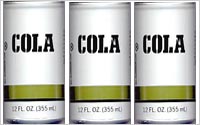 While the recession-era dread may be long gone, a
new study from Accenture finds that Americans are still in love with private-label grocery products. The research, based on 500 U.S. shoppers, finds that 64% of the shoppers surveyed buy store brands
at least half the time. And 39% have been buying more private-label goods in the past few years, and have no plans to return to brand names.
While the recession-era dread may be long gone, a
new study from Accenture finds that Americans are still in love with private-label grocery products. The research, based on 500 U.S. shoppers, finds that 64% of the shoppers surveyed buy store brands
at least half the time. And 39% have been buying more private-label goods in the past few years, and have no plans to return to brand names.
Nor is there any love lost between
shoppers and the brands they ditched along the way. Although 87% would buy more brand-name products if they were offered at the same price as the comparable private-label product, 51% said it would
have to be a permanent reduction in order to persuade them to switch back. And 77% say they would keep buying the same amount of these products, “even if their disposable income were to return
to the same level as it was before the economic downturn,” the consulting company reports.
advertisement
advertisement
Most striking is the consumer perception that these store brands are just as
good as branded products, with 50% of the respondents believing they are comparable. Some 42% say they trust the store brands they buy, and 28% say they prefer them. Just 9% do not buy store brands,
because they think they aren’t as good.
And consumers are responding favorably to stores’ efforts to improve and expand product lines, with 48% agreeing that stores are
offering more variety in private-label products, and 36% say they now view those products as “just another brand on the shelf.”
Of course, not everyone agrees. In a
study done late last year, for example, Deloitte LLP found that 49% of its respondents are losing interest in store brands. And of those who do buy them, 90% have already stabilized their choices, and
know which store products appeal to them, and which national brands do.
In its most recent calculation, the Private Label Manufacturers Association, working with data from
Nielsen, says that annual private-label sales are $88.5 billion, accounting for 19.1% of dollar sales in grocery stores, and 23.5% of all unit shares. In drug stores, they claim 14.7% of dollar sales,
and 16.2% of units.